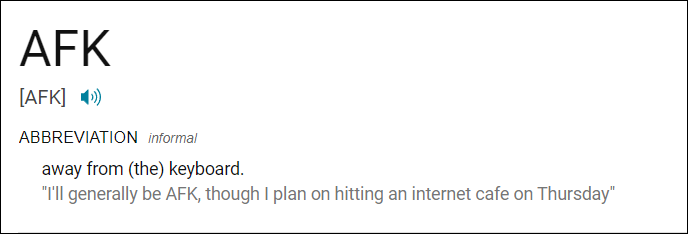AFK is an initialism that’s been highlighting our digital usage since the 80s. Although its now a ‘slang’, AFK initially began as a casual internet etiquette and has carried its image likewise even to this day. But, how in the world is something as informal, playful, and optional as slang viewed and used as ethics?
Most of us are consistently on some kind of device that has a texting client on it. Be it a mobile texting application, a chat section on a gaming platform, an informal communication space for work, etc., conversation on all these platforms flows via texts.
There are times when we may be away from our means to send a textual message or respond to one. This is when, AFK comes in as a signal. A code of conduct to let the other person know we’re unavailable at the moment — either to send or receive texts.
When and Where Did AFK Come From?
AFK is one of the most popular gaming slangs and not surprisingly, the origins of the acronym is lies in the gaming sphere. As mentioned above, AFK was coined somewhere between the 1980s and the 1990s. Video games may have been closer to becoming well established, but the internet and online gaming was just about up and coming.
Internet in those days wasn’t as essentially available as it is now. It was an on-and-off situation. Using the internet during its infancy had its own disadvantages. The biggest one being uncertainty. After a single internet session, it took a while before the next. If you were to then inform a gaming pal or a friend about your disappearance, ‘AFK’ came into place. Hence, the understanding that this slang is online etiquette.
What Does AFK Mean Online?

AFK stands for ‘Away From Keyboard’. This is an informal heads up to the recipient, informing them that we’re doing exactly what the slang says — away from the keyboard/keypad. It either means we’re unavailable to text, going offline, or taking a break from a textual conversation.
Though we mentioned ‘AFK’ to be texting slang, it is applicable while taking a break from any digital activity as well. Apart from chatting, gaming is the other biggest platforms that uses AFK the most. This acronym notifies your teammates that you’re briefly off the keyboard and/or off the gaming console.
AFK typically suggests a short interval in your online presence, but can be used for longer intervals as well.
How to Use AFK?
AFK is a keyboard-specific slang as opposed to it’s cousin ‘BRB’ (Be Right Back). While BRB has a generic inference, AFK informs that you are only ‘Away From Keyboad’ and may or may not be online otherwise. However, AFK’s usage does overlap with BRB as they both imply the same absence and ideally for the same amount of time.
If you’re taking a break – AFK works as a colloquial way to say you’re taking a pause from digital activity — can be gaming, chatting, emailing, etc. For example, ‘Okay, will update in just a bit. AFK for now!’.
If you’re only away from your keyboard – This use-case focuses on the core usage of AFK. If you’re busy watching something, attending a meeting, doing anything that doesn’t include your keyboard, AFK will do its job. For example, ‘Important meeting with the team between 14:00 and 16:00. AFK throughout!!‘.
While going offline – AFK is also an efficient slang to quickly let someone know you’re going offline — as being AFK also implies that you may be away from the system and not just the keyboard. Like, ‘I’ll get back to your ASAP. AFK.’.
While taking an off – Apart from being an acronym that suggests a quick break, you can also use AFK as your status presence. This can be on a work platform (provided yours is a casual work place) or on your personal social networking profile. For instance, if you’re a coder and you’re taking a much-needed off, AFK would would a fitting status presence!
Other Use-Cases
Apart from using AFK to convey your own absence from a digital platform, you can also use it to communicate the same about someone else. For instance, ‘Not sure. He’s been AFK for almost 3 hours now’.
Besides these objective scenarios for using AFK, you can also apply the acronym as a warning when you’re texting device is about to be in someone else’s hands. Many times we don’t have enough time to tell the recipient to stop texting, and may get caught in a moment of embarrassment should a notification window appear.
AFK can come in handy at such times. For example, ‘Hahaha. That was the worst thing that happened last night!! Okay, AFK’ or ‘Dude, don’t even get me started on the micromanagement in here. AFK’. However, for this to work, the recipient must be aware of your use-case of the initialism and understand the immediate implication!
Conclusion
AFK is one such slang on the internet that elaborates our profound use of digital media. It acts as an effective term to inform of brief or extended digital absence. AFK can be used as a slang to update an offline status on social media or work media (if allowed), in addition to letting someone know that you’re off the keyboard or taking a screen break.










Member discussion